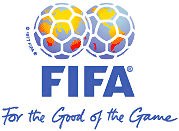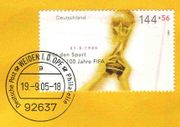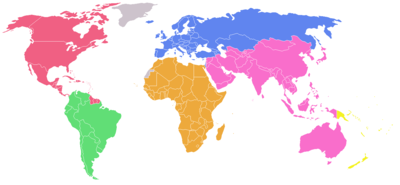FIFA
Football World Cup 2006 Germany
FIFA
FIFA World Cup

The Fédération Internationale de Football Association, universally
known by its acronym FIFA, is the international
governing body of football (soccer). Its headquarters are in Zürich, Switzerland
and its current president is Sepp Blatter.
History
The need for a single body to oversee the worldwide game became apparent at
the beginning of the
20th century with the increasing popularity of international fixtures. The
English Football Association had chaired many discussions on setting up an
international body, but was perceived as making no progress. It fell to seven
other European countries to band together to form this association. FIFA was
founded in Paris on May 21, 1904 - the French name and acronym persist to this
day, even in English-speaking countries. Its first president was Robert Guérin.
FIFA presided over its first international competition in 1906, however it
met with little approval or success. This, in combination with economic factors,
led to the swift replacement of Guérin with Daniel Burley Woolfall from England,
by now a member association. The next tournament staged, the football
competition for the 1908 Olympics in London was more successful, despite the presence of
professional footballers, contrary to the founding principles of FIFA.
Membership of FIFA expanded beyond Europe with the application of South
Africa in 1909, Argentina in 1912 and the United States in 1913.
FIFA however floundered during World War I with many players sent off to war
and the possibility of travel for international fixtures severely limited.
Post-war, following the death of Woolfall, the organisation fell into the hands
of Dutchman Carl Hirschmann. It was saved from extinction, but at the cost of
the withdrawal of the Home Nations, who cited an unwillingness to participate in international
competitions with their recent World War enemies.
The FIFA collection is held by the
National Football Museum in
England.
The World Cup
 FIFA World Cup Trophy on a German
Stamp
FIFA World Cup Trophy on a German
Stamp
Jules Rimet became the third President of FIFA in 1921. He presided
over another two successful Olympic competitions despite the absence of
England and
Scotland. The success of the competitions, combined with the rising profile of
the game, allowed FIFA to seriously consider, for the first time, staging its
own regular World Championship. Talks on the matter began in 1928, and the first
World Cup took place in
Uruguay in 1930 and was won by the home nation. Despite the reluctance of
participation from European nations (due to the travel time required and the
ongoing economic depression), the tournament was considered a success and plans
were laid for the next World Cup in 1934, in Italy.
Excluding a break for
World War II, the World Cup continues to be held once every four years, with the
most recent tournament in 2002 held in South Korea and Japan. The next World Cup
will be held in Germany in 2006.
Other tournaments
Aside from the World Cup and Olympic competitions, FIFA organises World
Championships for players at under-17 level and youth level. In addition to
this, it has introduced the Confederations Cup, a competition for the champions from each confederation
(plus the hosts and World Cup Winners), every two years; in the year before a
World Cup, it serves as a dry run for that competition, with the World Cup host
staging the tournament as a test of facilities.
With the development of the women's game, FIFA introduced the Women's World
Cup in 1991 and the Women's Under-20 World Championship in 2002 (started as
U-19, will become U-20 in 2006). A U-17 women's championship will start in 2008.
FIFA's only major club competition is the FIFA Club World Championship. It
was slated as the natural progression of the European/South American Cup (which
itself ran under a variety of names) to include clubs from all confederations.
The tournament was not warmly received on its debut in 2000 and its 2002 edition
was cancelled. Three years later, with a shorter revised format, the tournament
returned for its 2005 edition in Japan.
FIFA also presides over World Cups in modified forms of the game including
beach football (the FIFA Beach Soccer World Cup and futsal (the FIFA Futsal
World Championship).
Laws of the game
The
laws of football that govern the game are not solely the responsibility of FIFA;
they are maintained by a body called the International Football Association
Board (IFAB). FIFA has a 50% representation on its board (four representatives);
the other four are provided by the football associations of England, Scotland,
Wales, and Northern Ireland, in recognition of the British nations' unique contribution
to the creation and history of the game.
Organisation
 Map of the World with the six confederations.
Map of the World with the six confederations.
Under the auspices of the President, FIFA is split into six confederations
which oversee the game in the different continents and regions of the world.
National federations must claim membership to both FIFA and the confederation in
which their nation is geographically resident for their teams to qualify for
entry to FIFA's competitions (with a few geographic exceptions listed below):
Nations straddling the traditional boundary between Europe and Asia have
generally had their choice of confederation. As a result, nations including
Russia and Turkey have chosen to become part of UEFA despite the bulk of their
land area being in Asia. Israel, although lying entirely within Asia, joined
UEFA in 1994, after decades of isolation by many of its Middle Eastern
neighbours. Kazakhstan were the latest nation to make the move from AFC to UEFA,
in 2002.
Guyana and Suriname have always been CONCACAF members despite being South American
countries.
Australia have been given permission to join the AFC instead of the OFC from
2006 onwards.
Australia have long lobbied for a change due to
its national team's strength, which is disproportionate to the other Oceania
teams. No team from the OFC is offered automatic qualification to the World Cup;
instead the winner of their section must play a play-off against a CONMEBOL
side, a hurdle at which Australia have traditionally fallen. Perhaps ironically,
Australia successfully qualified for the
2006 World Cup by winning
just such a playoff in a penalty shootout against Uruguay, just a few months after the clearance to move was granted.
In total, FIFA recognises 207 national federations and their associated
national teams; see the list of national football teams and their respective
country codes. The FIFA World Rankings are updated monthly and rank each team
based on their performance in international competitions, qualifiers, and
friendly matches. There is also a world ranking for women's football, updated four times a year.
Recognitions and awards
FIFA awards, each year, the title of
FIFA World Player of the Year to the most prestigious player of the year, as
part of its annual awards ceremony with also recognises team and international
football achievements.
As part of its centennial celebrations in
2004, FIFA
organised a "Match of the Century" between
France and
Brazil, the most successful national teams of the last decade. In addition,
it commissioned arguably the most famous player ever,
Pelé, to produce a list of the greatest players of all time. This list, the FIFA
100, included 50 players who were still actively playing at the time of
publication (one of whom was female), and 75 retired players (including himself,
but not including deceased players, with one woman). The list was originally planned to be just 100 players long but Pelé
is understood to have found it too hard to choose just 100.
Commercial activities
FIFA announced in April 2004 that it is expecting to earn $144 million profit
on $1.64 billion in revenue between 2003 and 2006 (the 4 year
cycle including the 2006 World Cup).
FIFA has licensed its name and copyrighted content to computer game designer
EA Sports to provide a number of football simulation games for PC and various
game consoles. A new instalment in this FIFA series of games is introduced each
year, and additional versions are released with World Cup branding to coincide
with these tournaments. 2005 saw an additional "urban football" video game
franchise, FIFA Street, added.
External links
Home | FIFA | Qualification | Venues | Teams | Groups | Stages | Goleo | Miscellaneous | License
Football World Cup 2006, made by MultiMedia | Free content and software
This guide is licensed under the GNU
Free Documentation License. It uses material from the Wikipedia.
|




